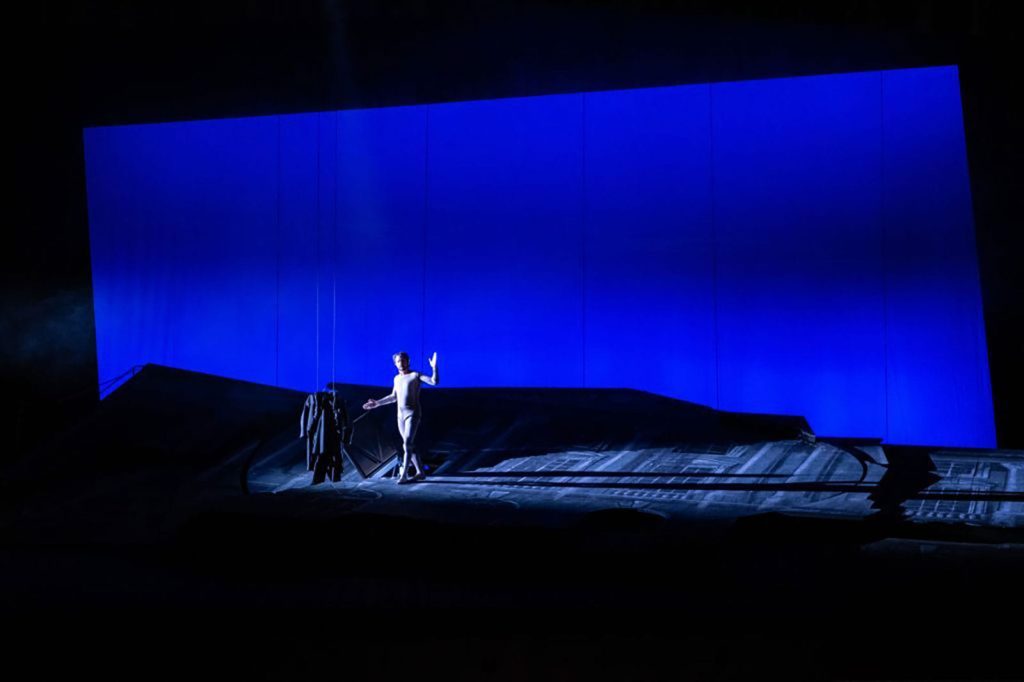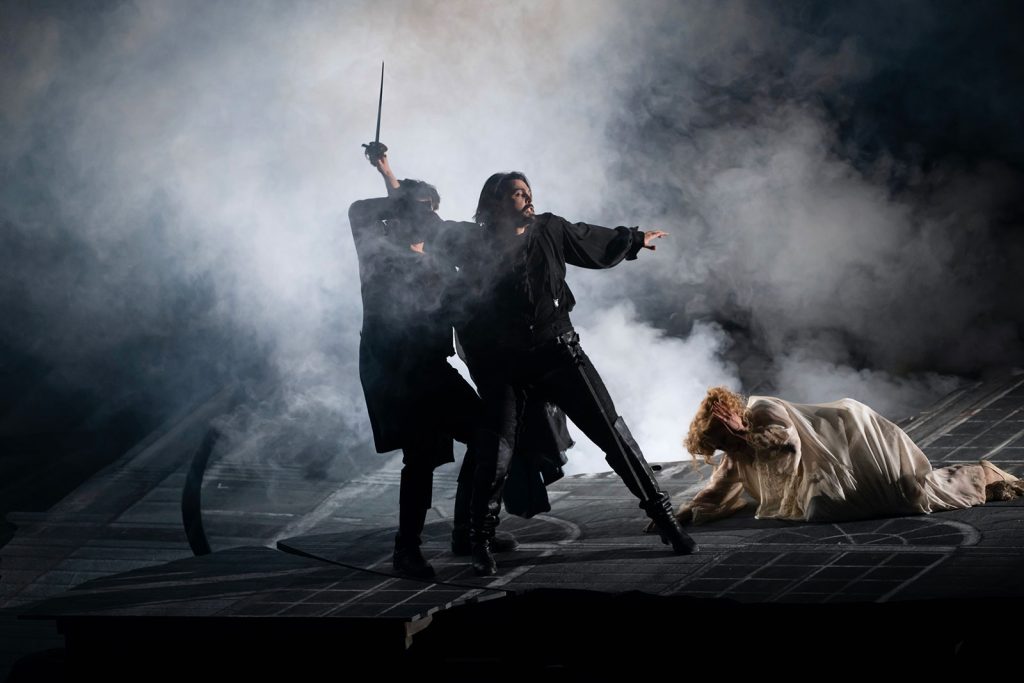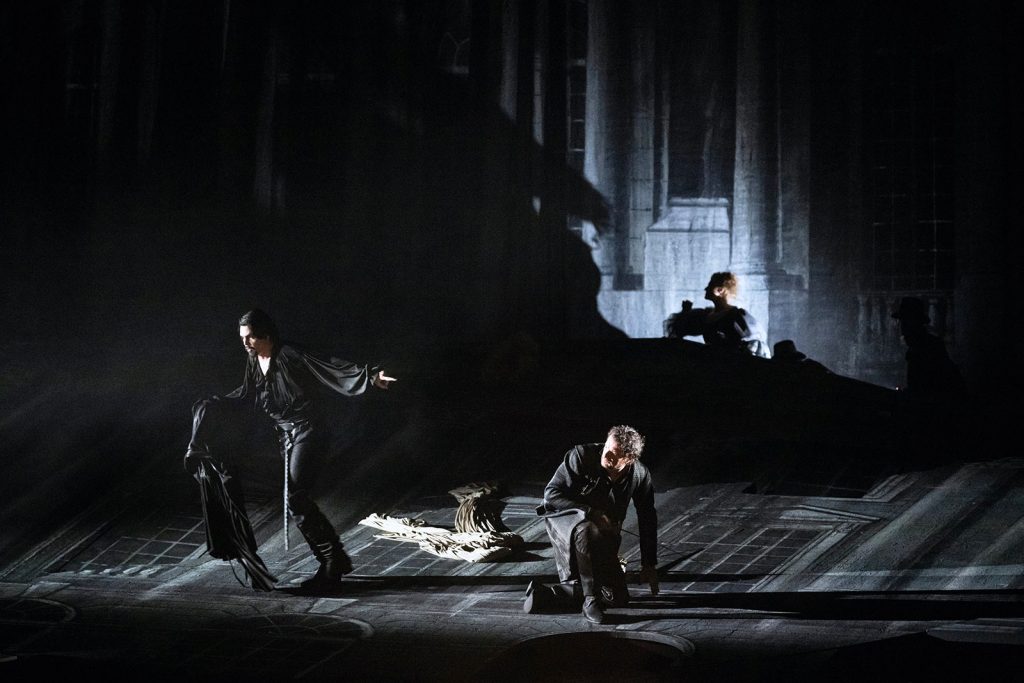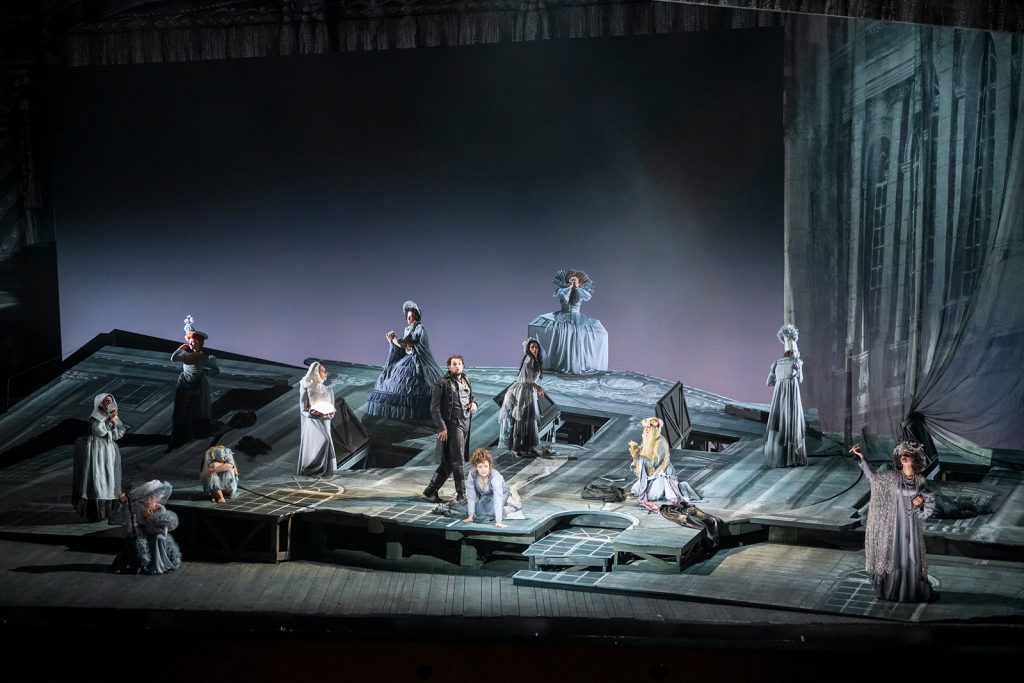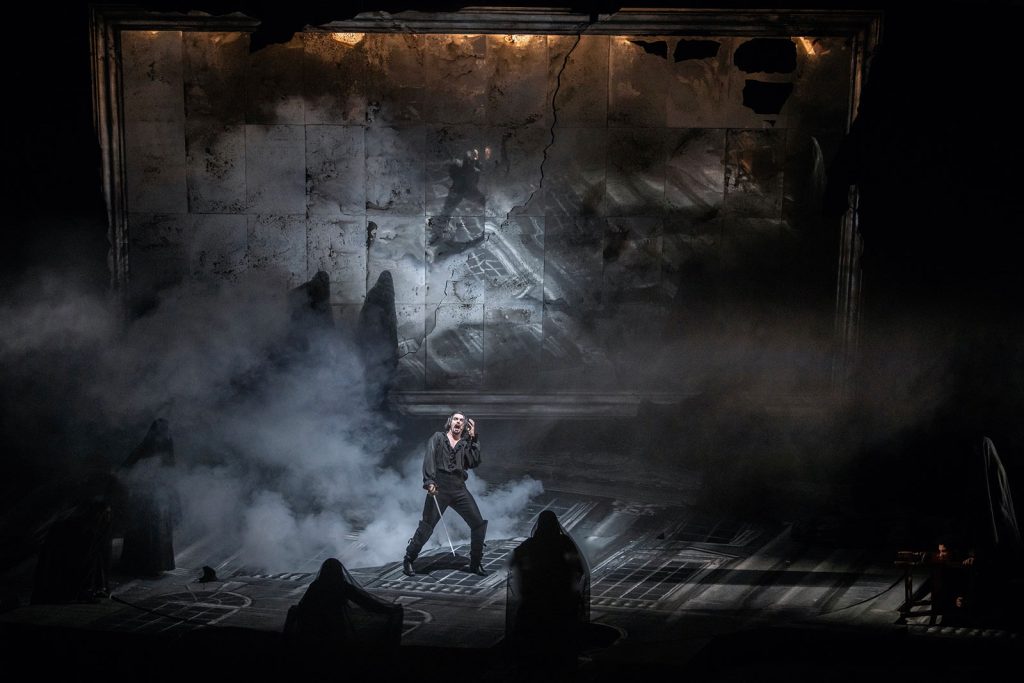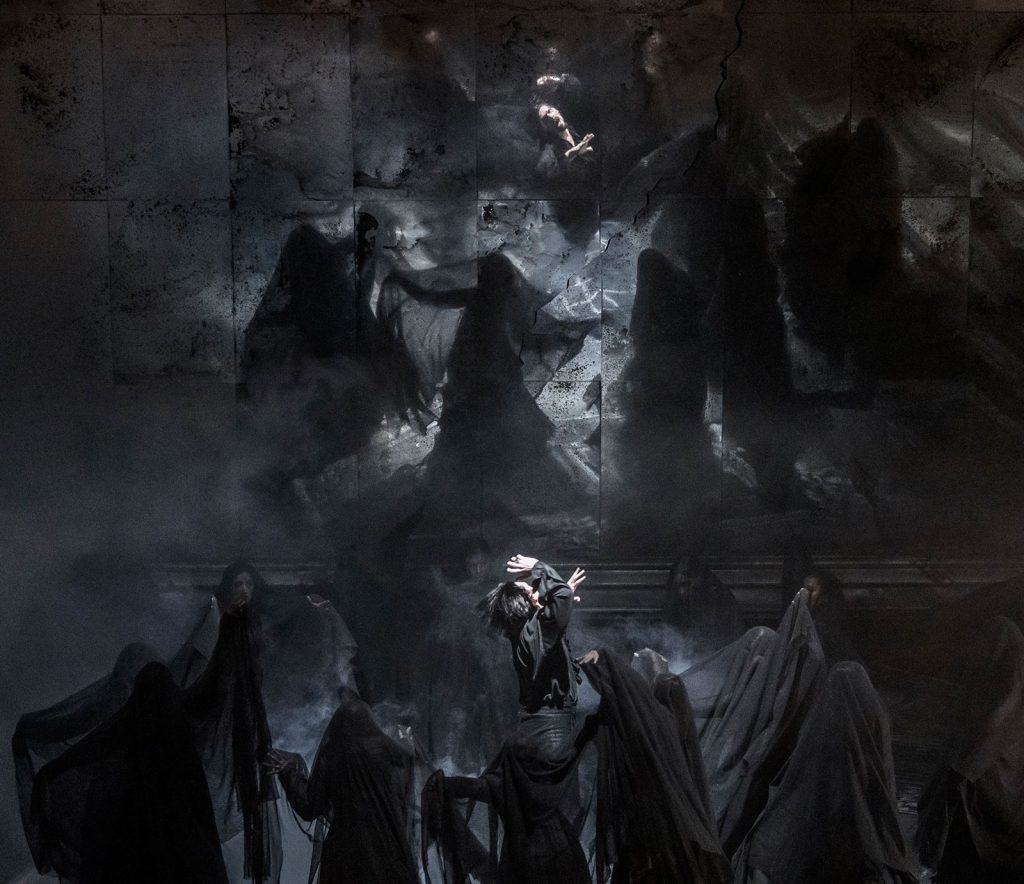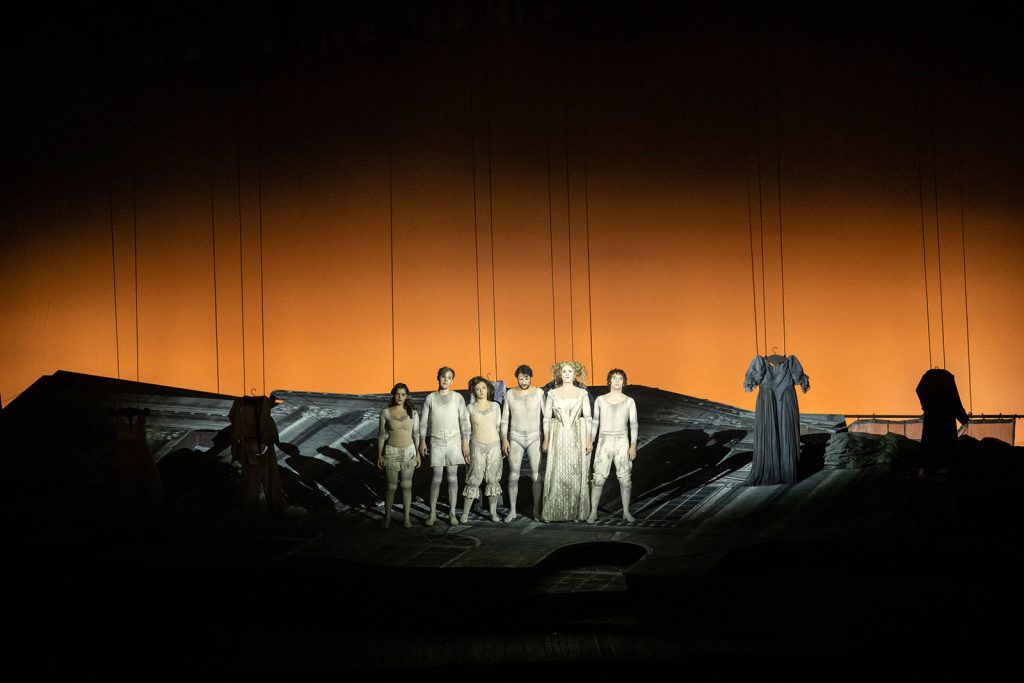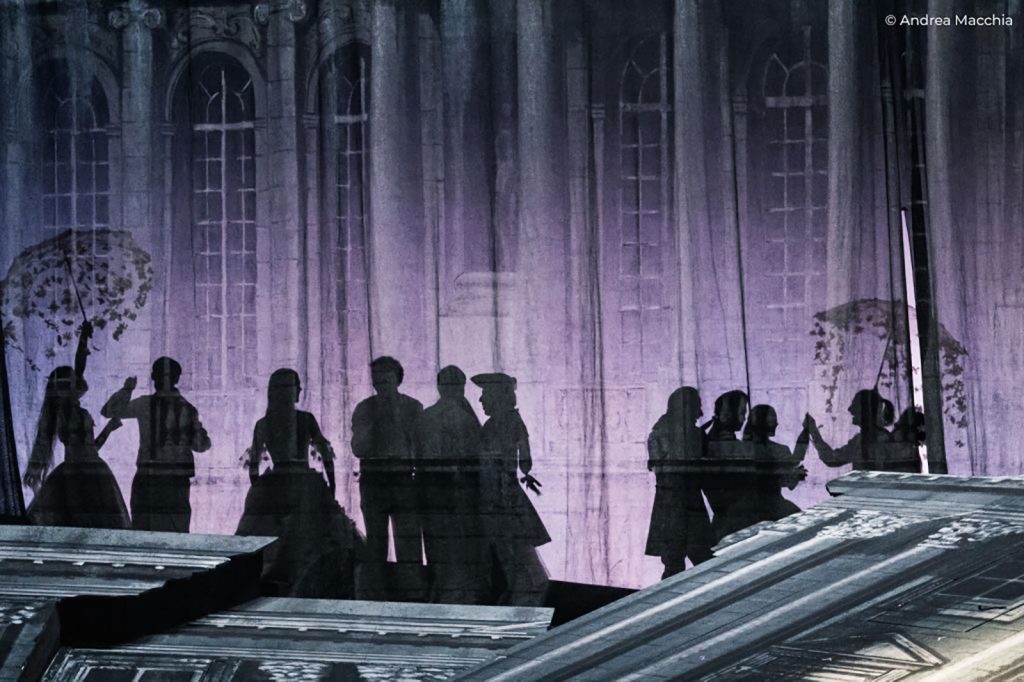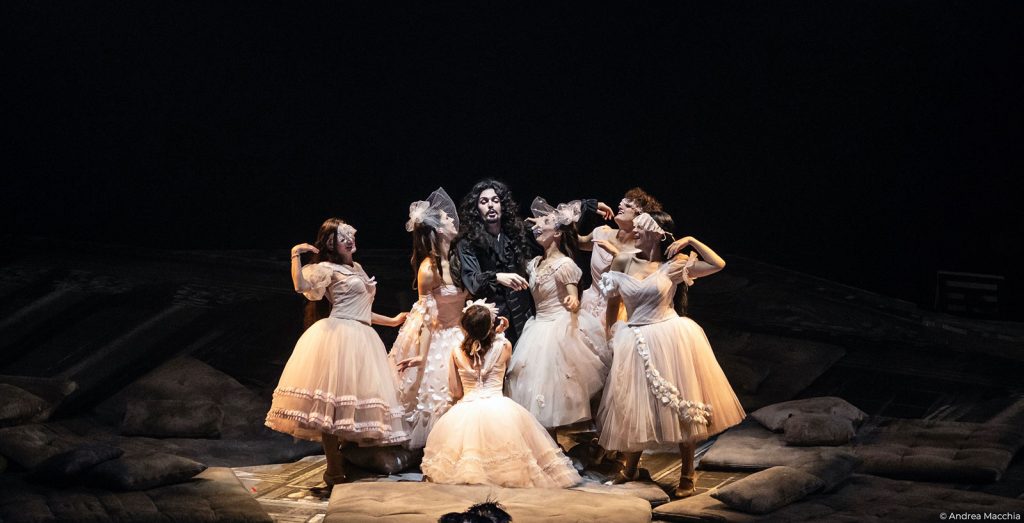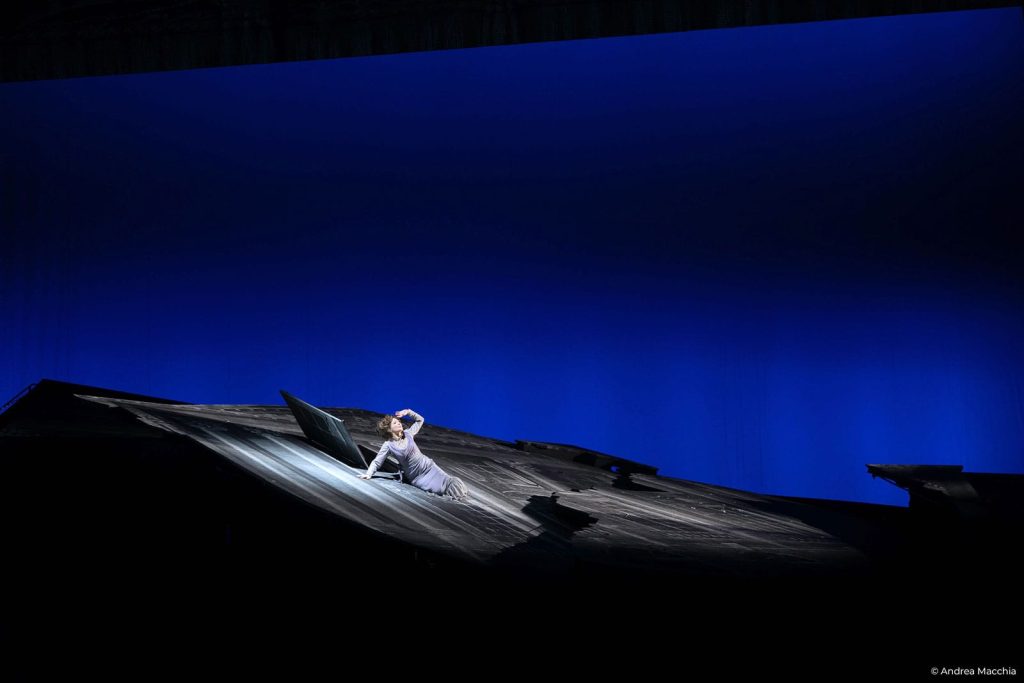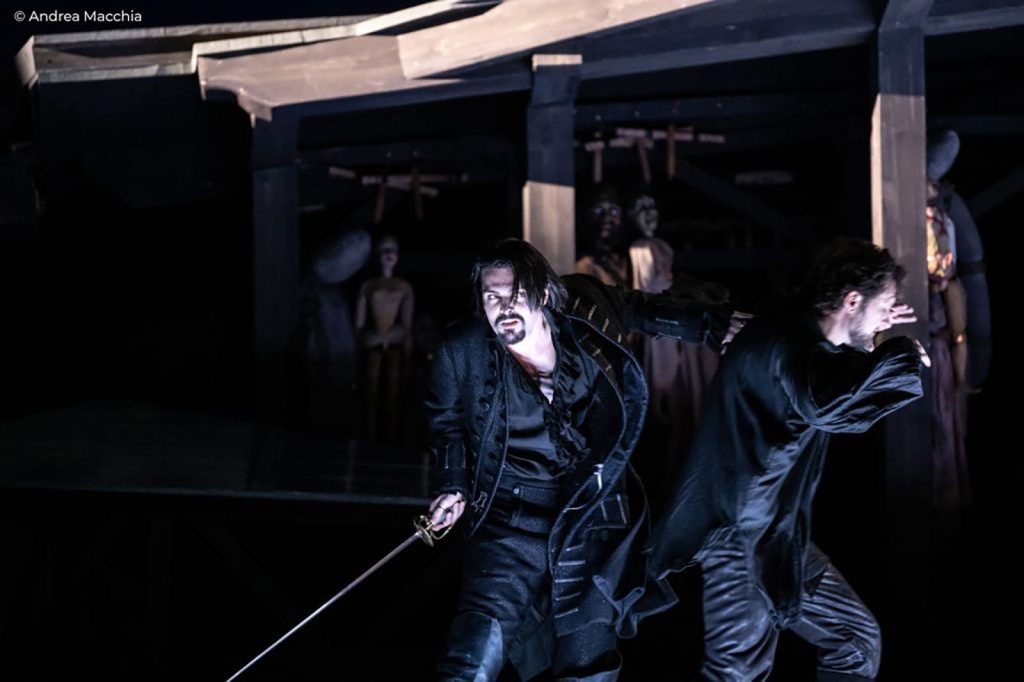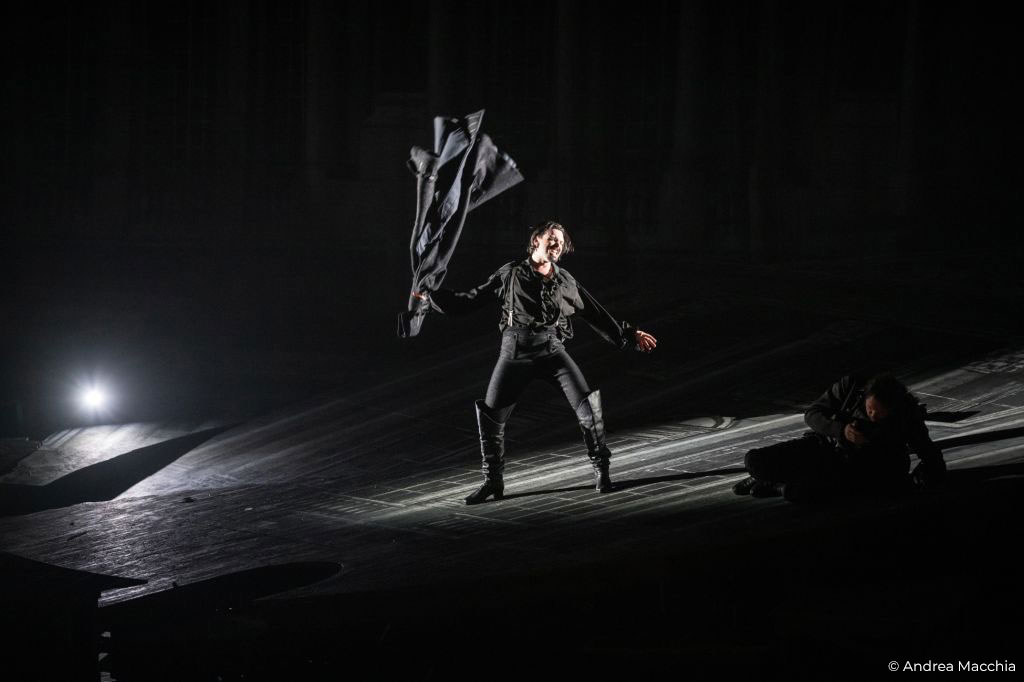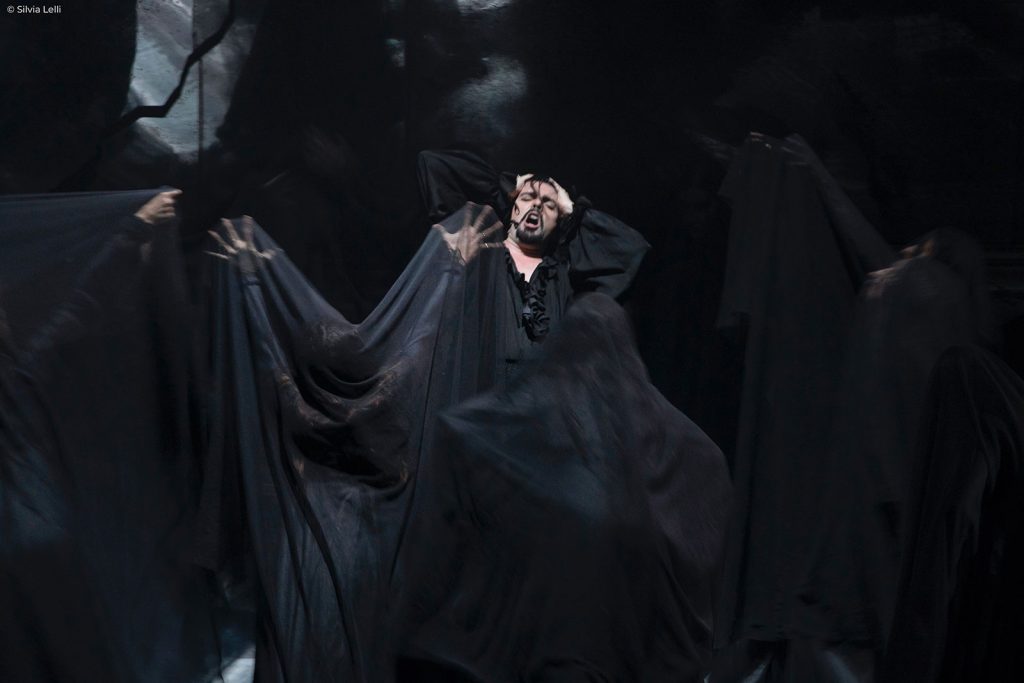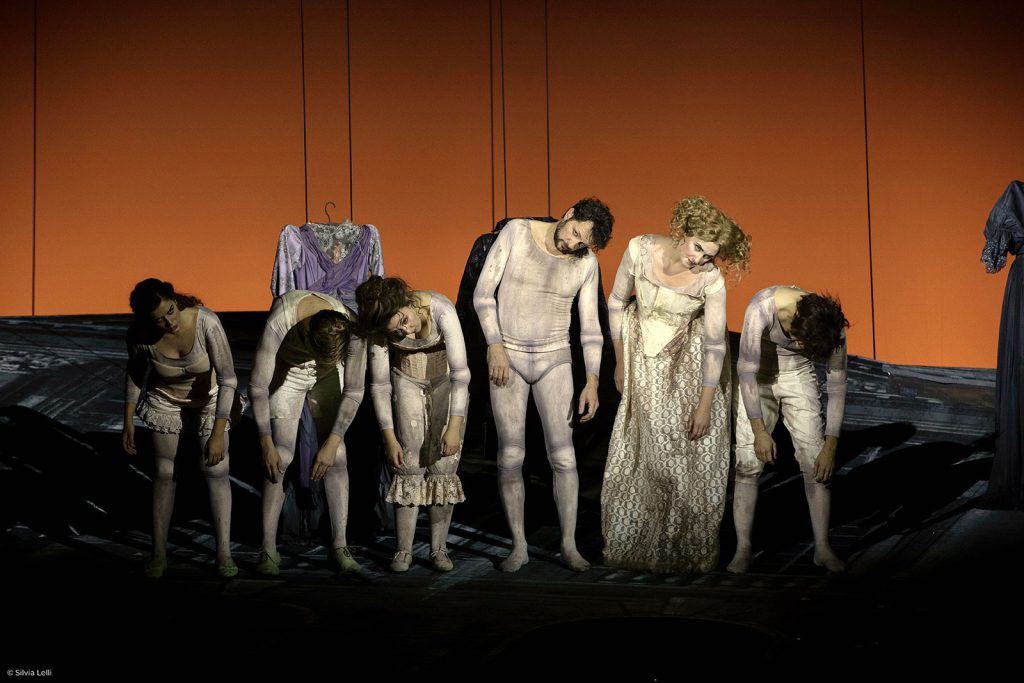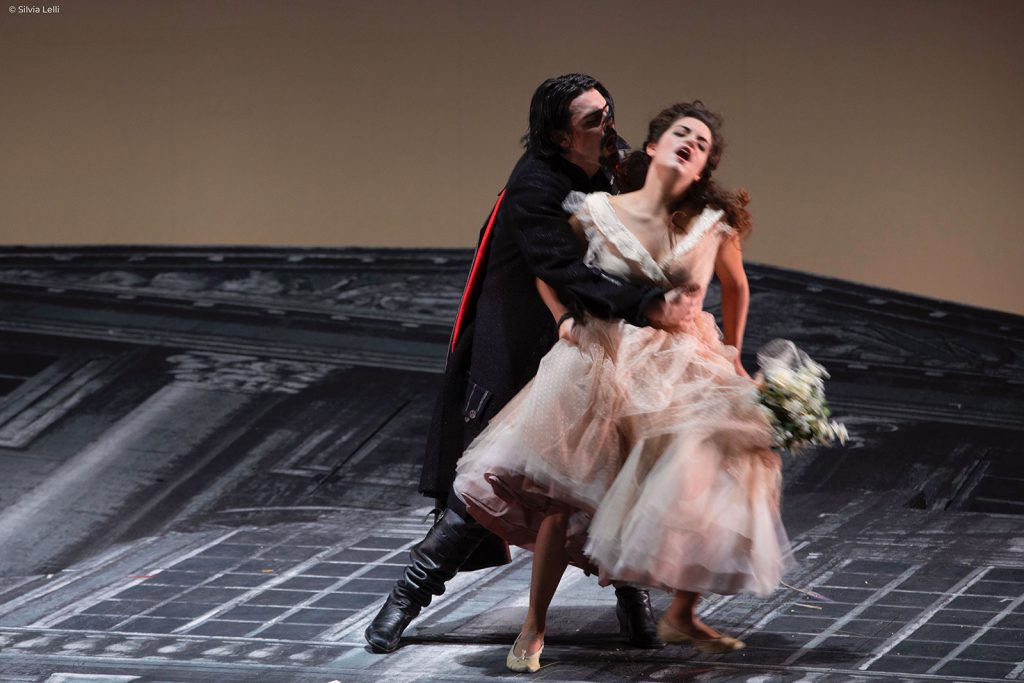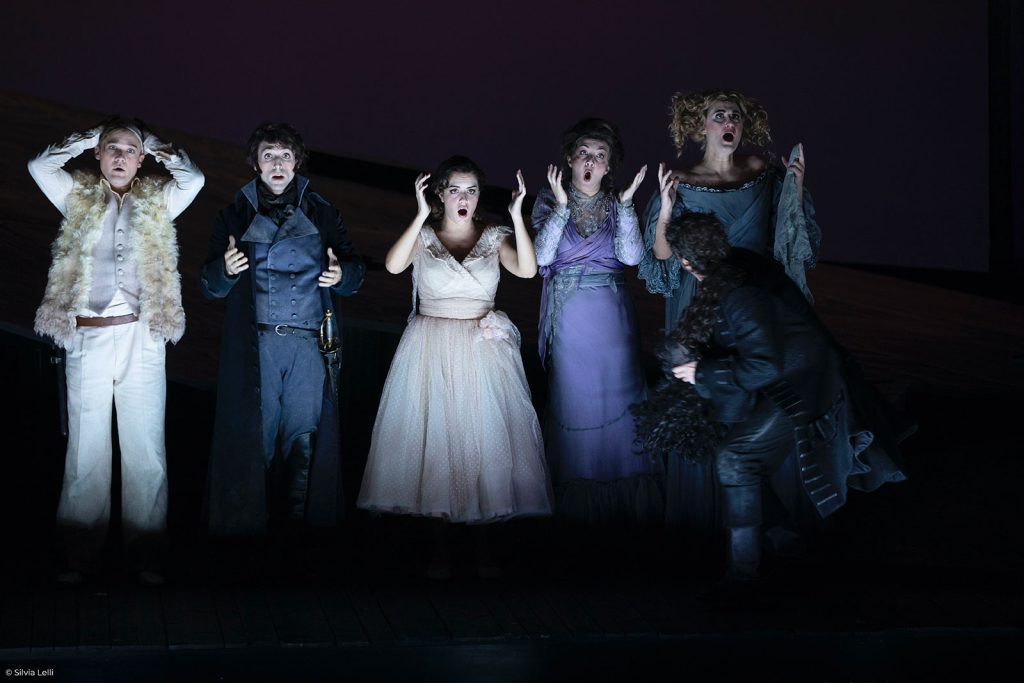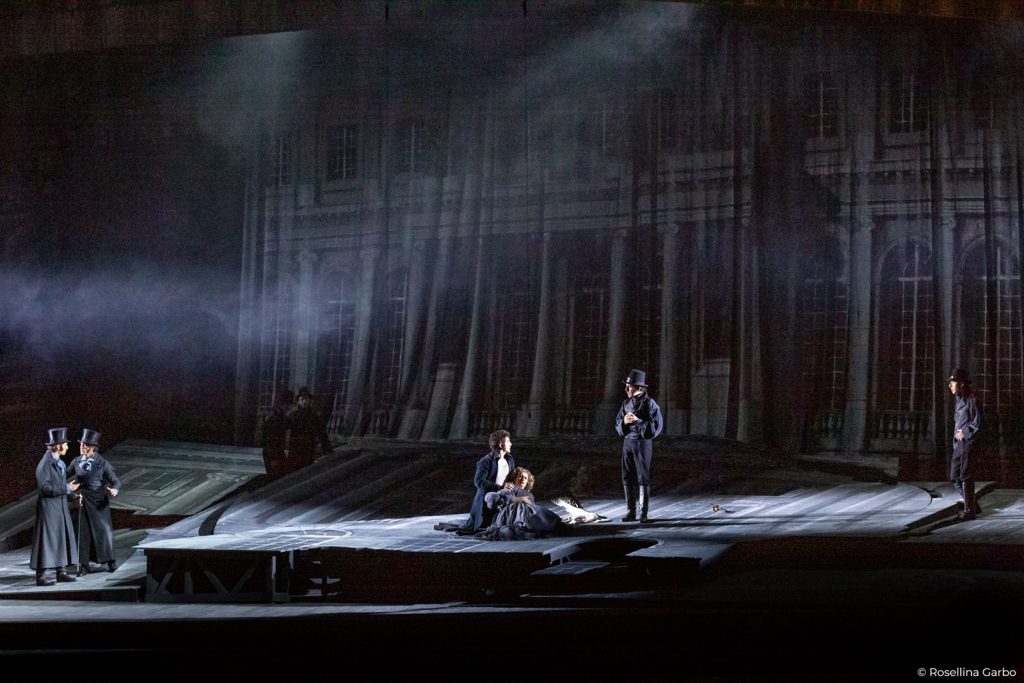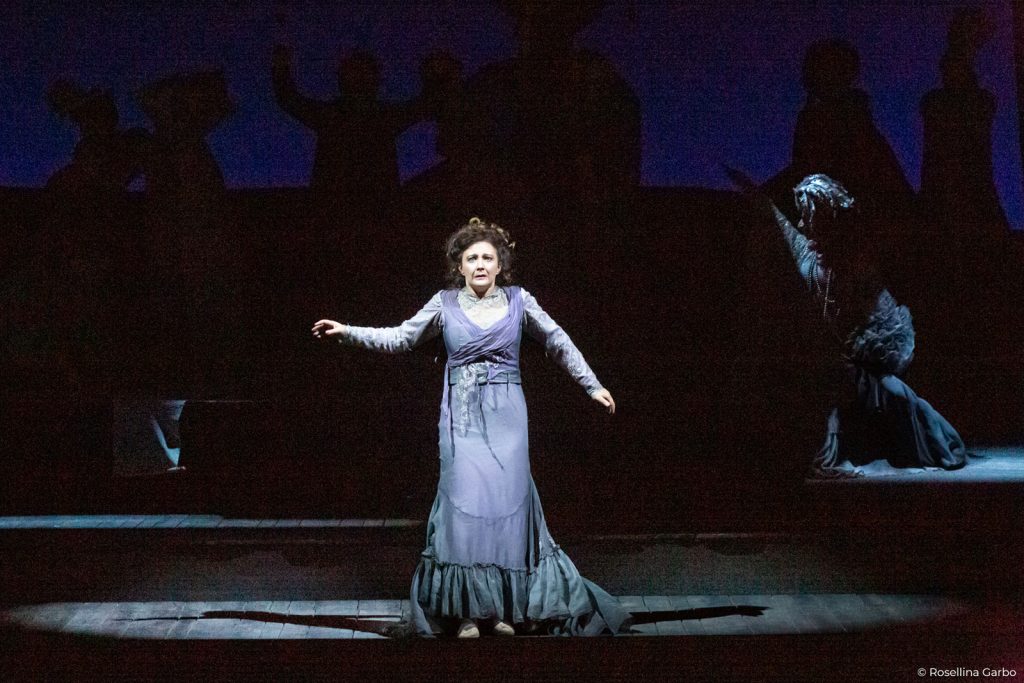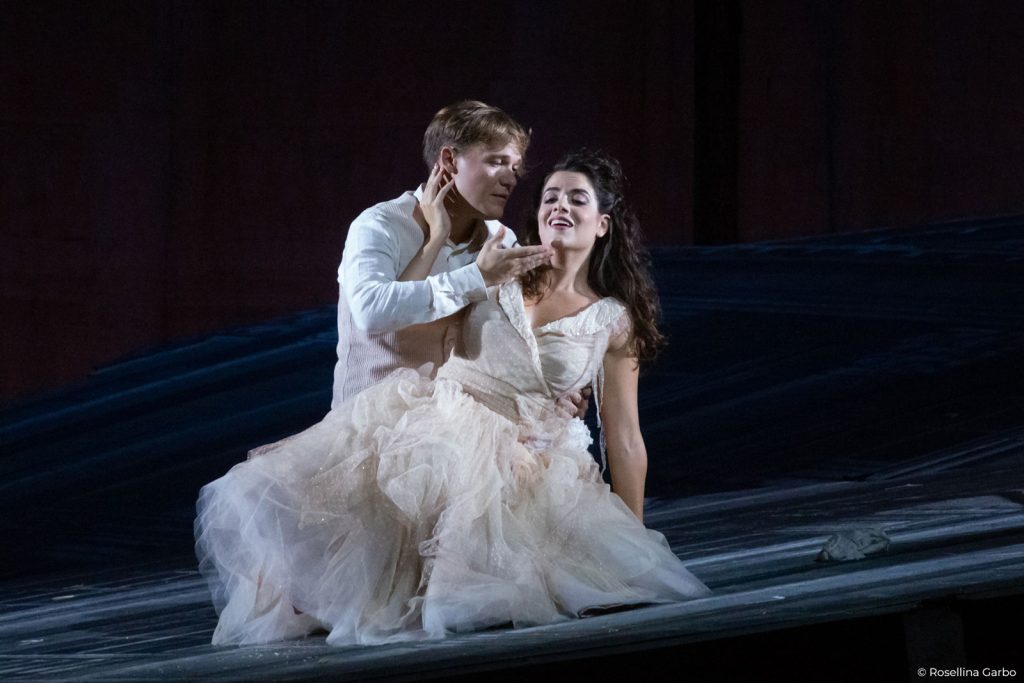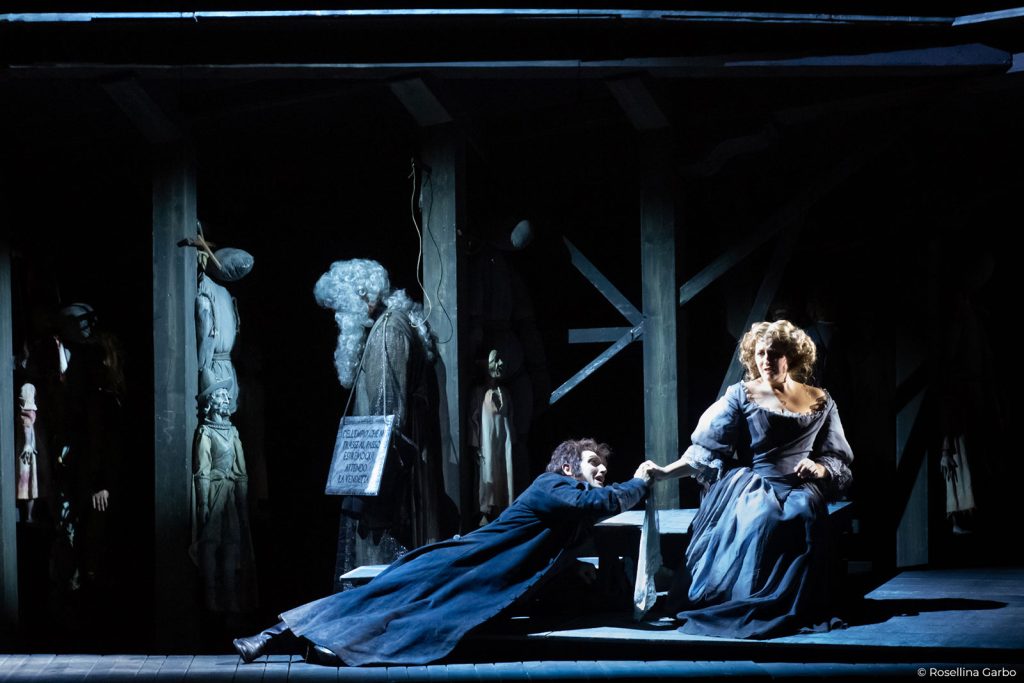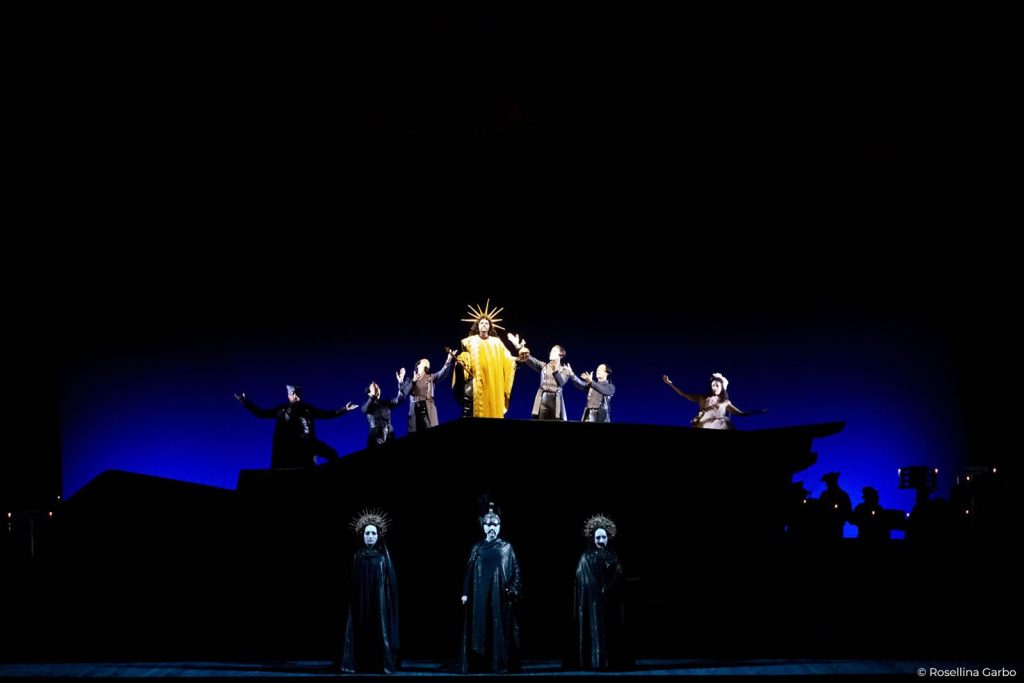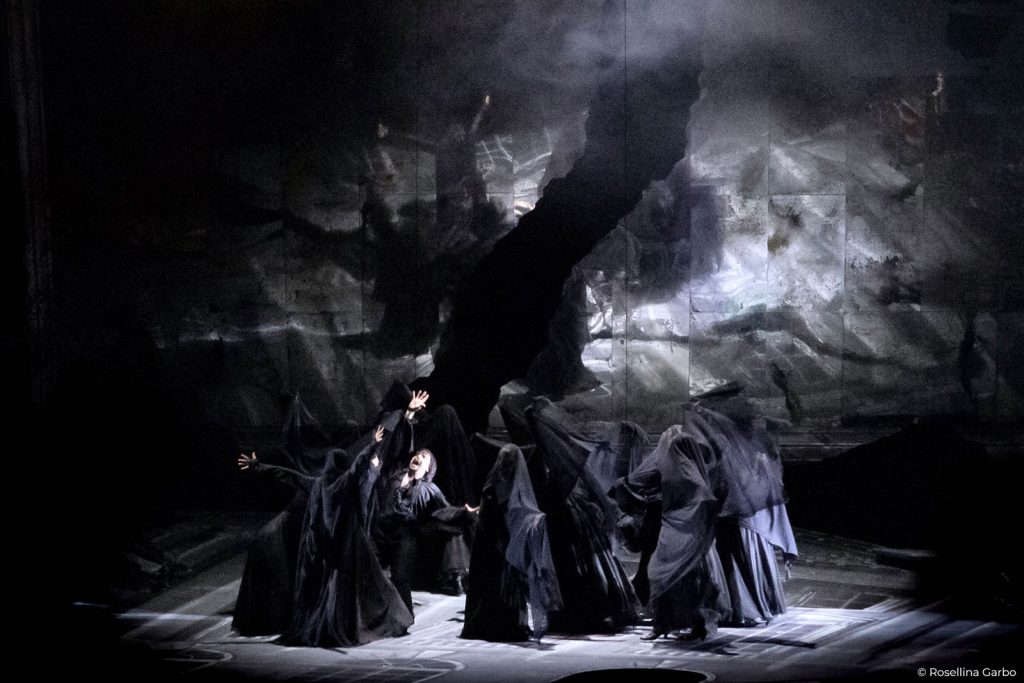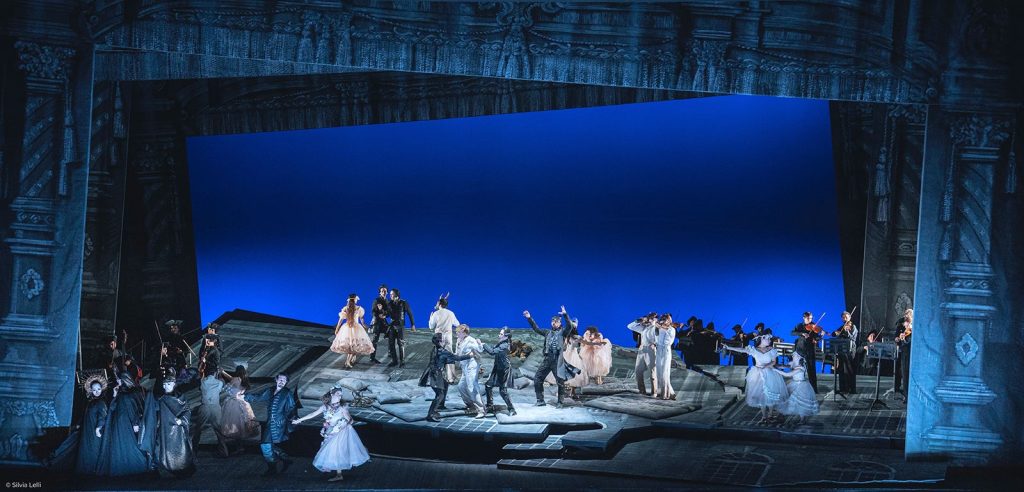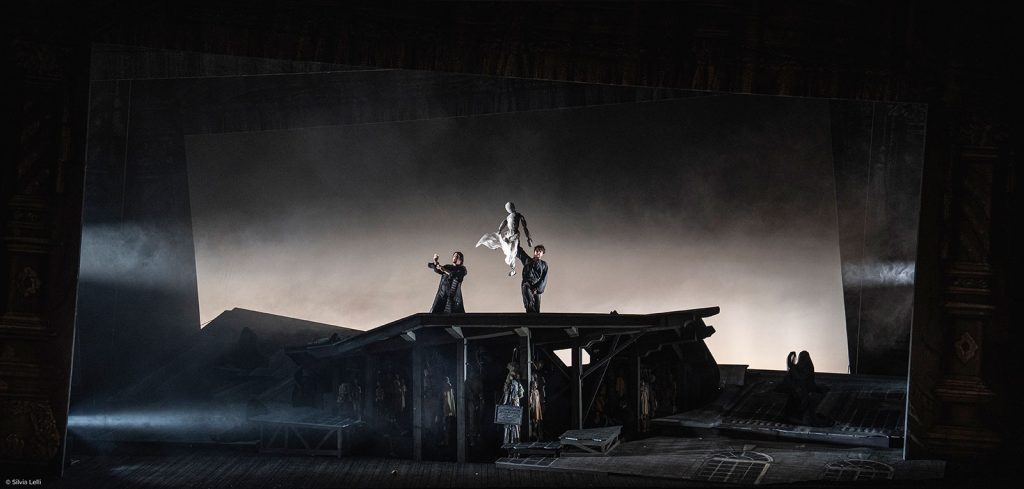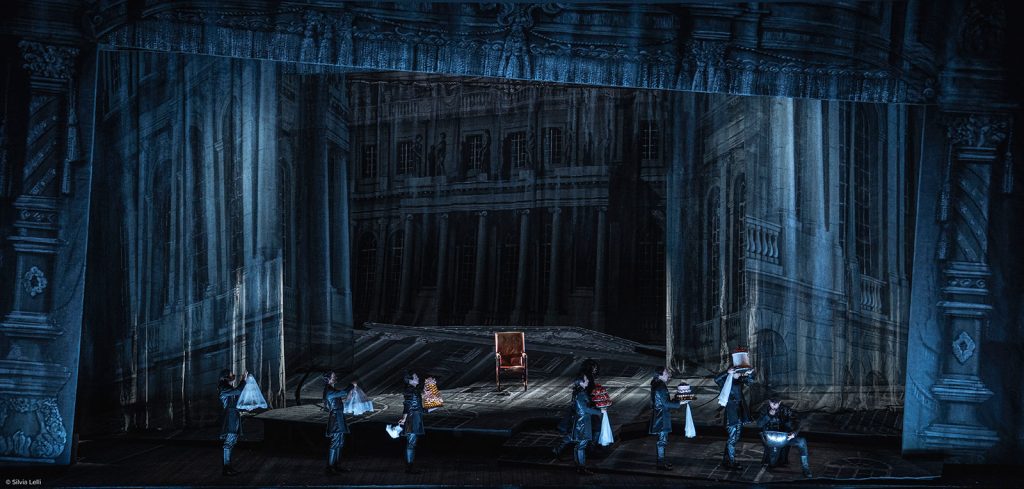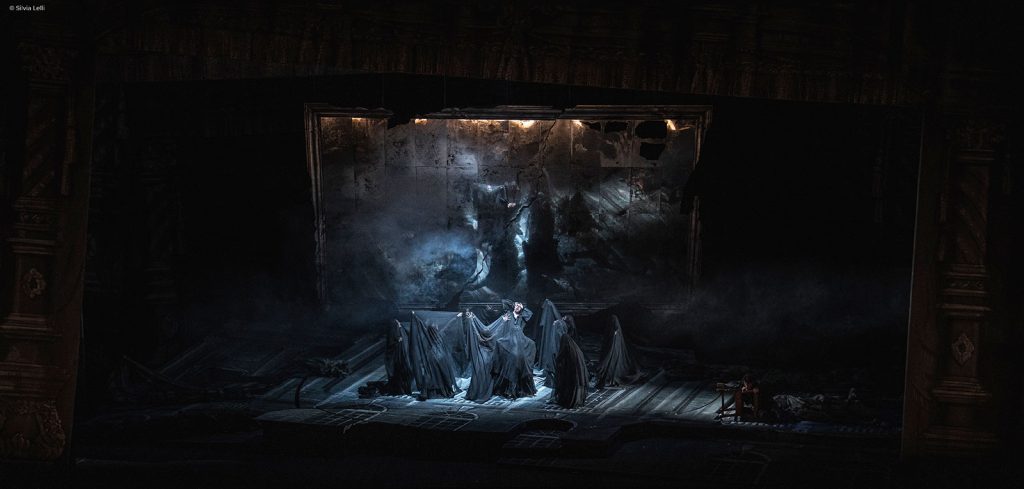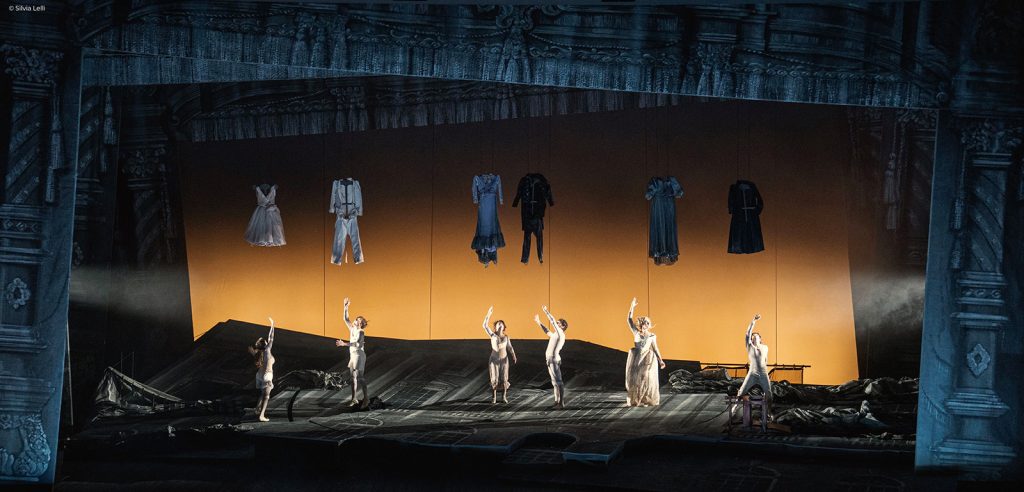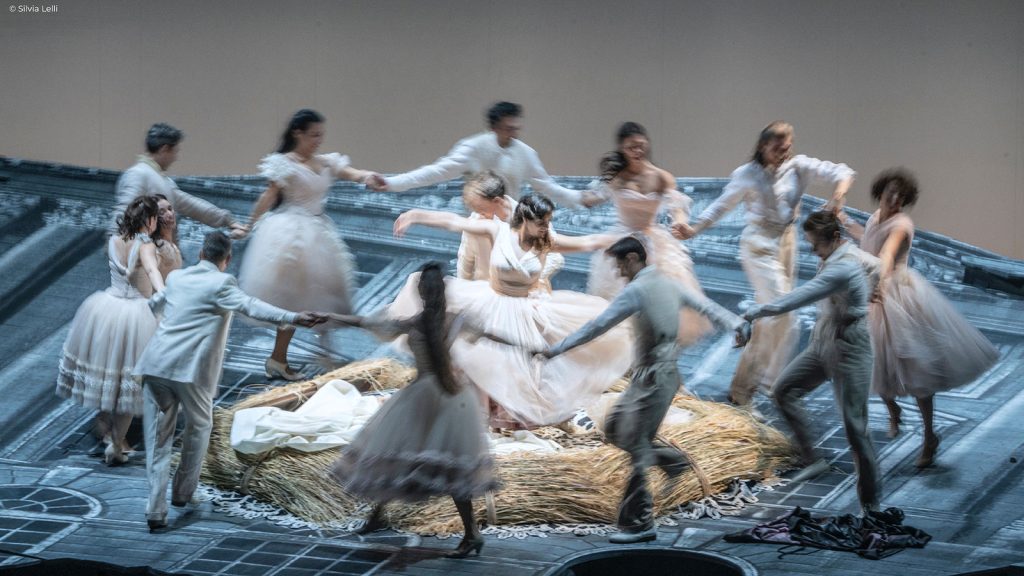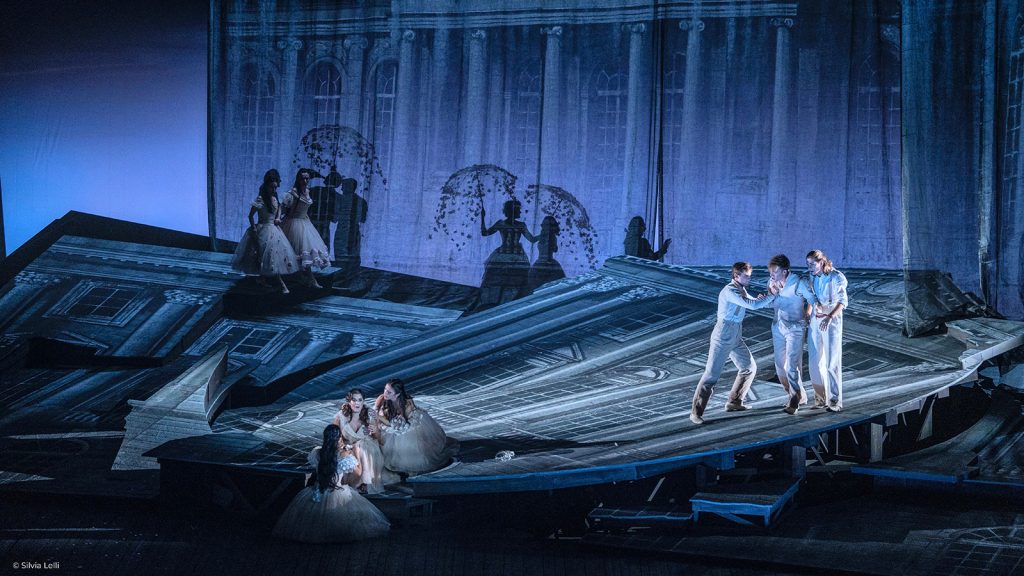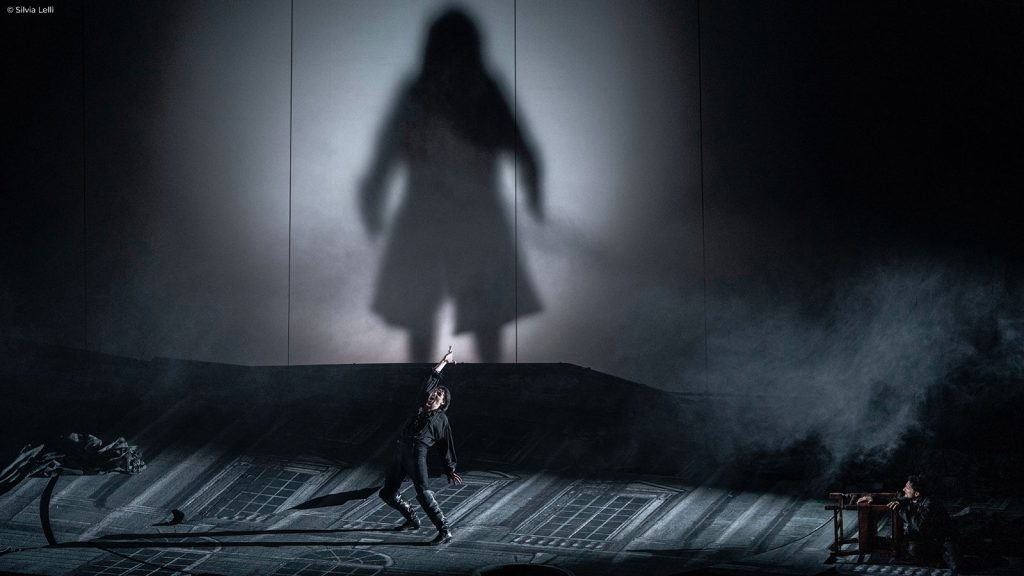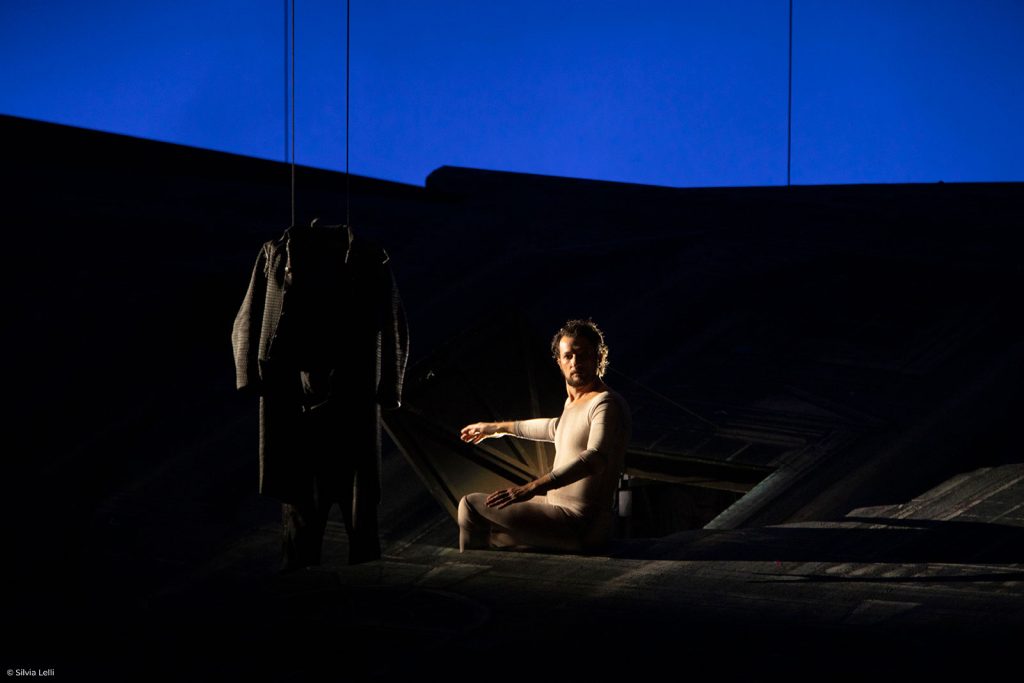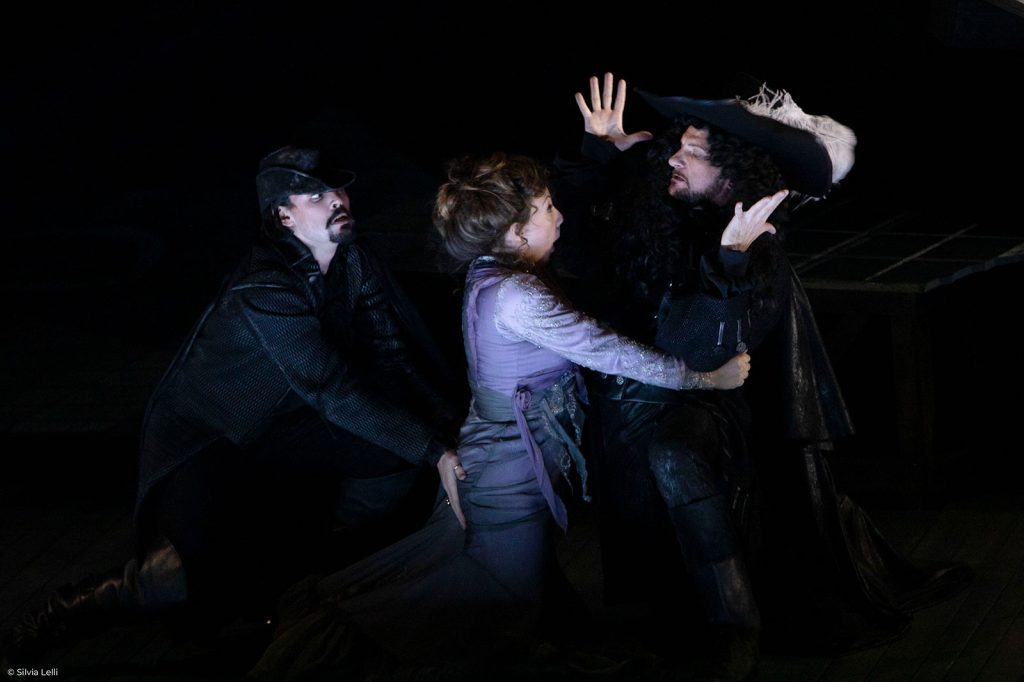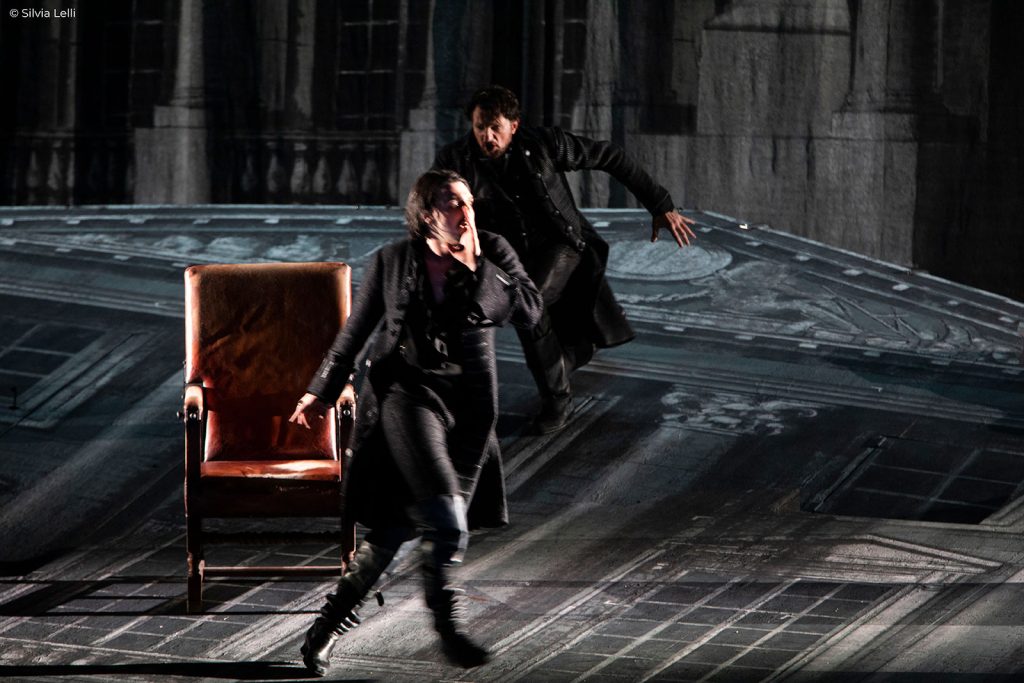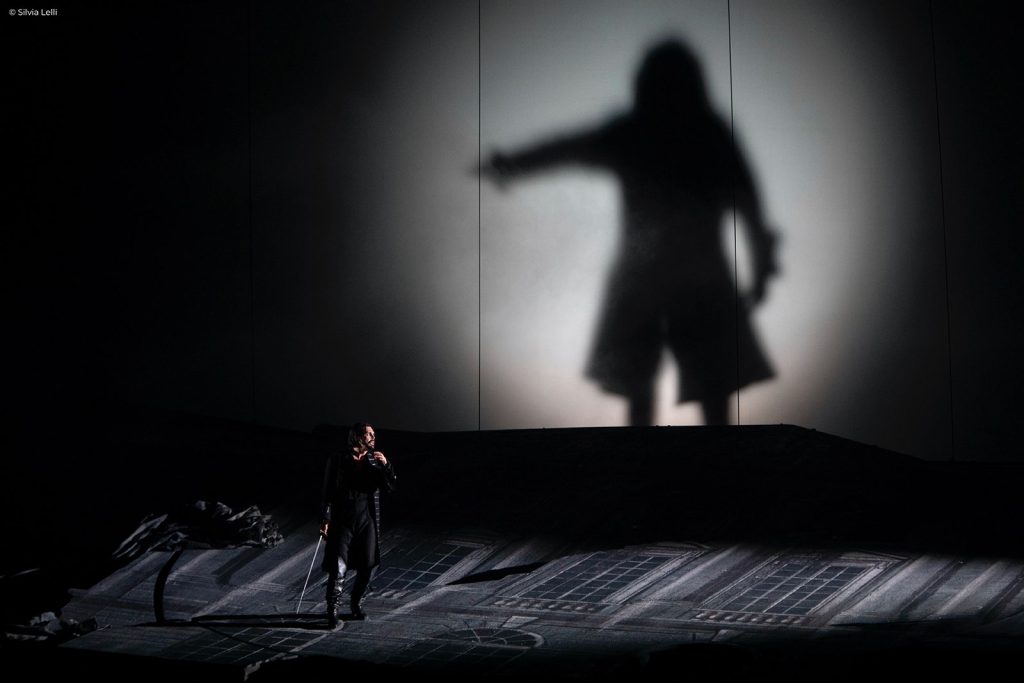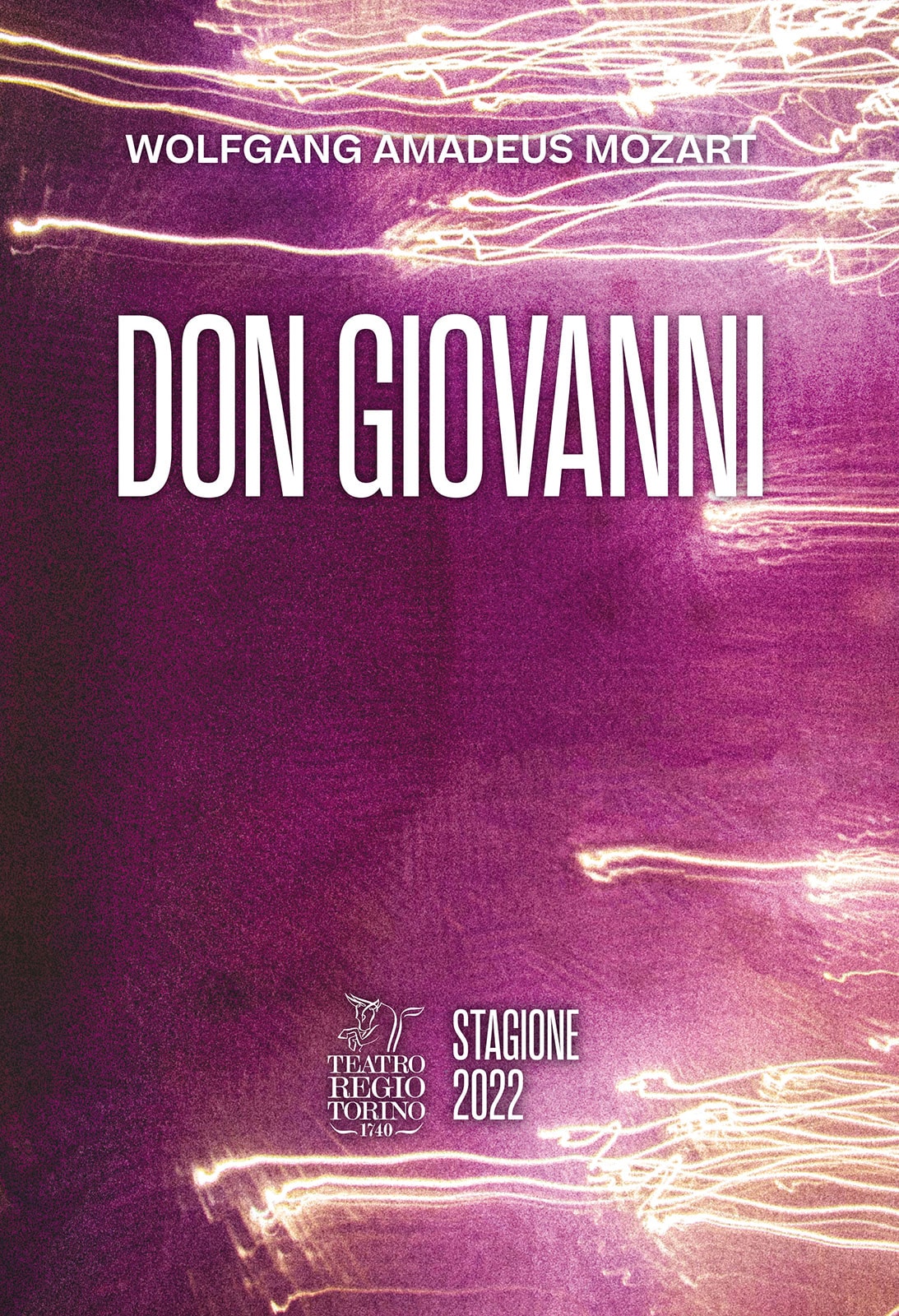
02 Jul Don Giovanni
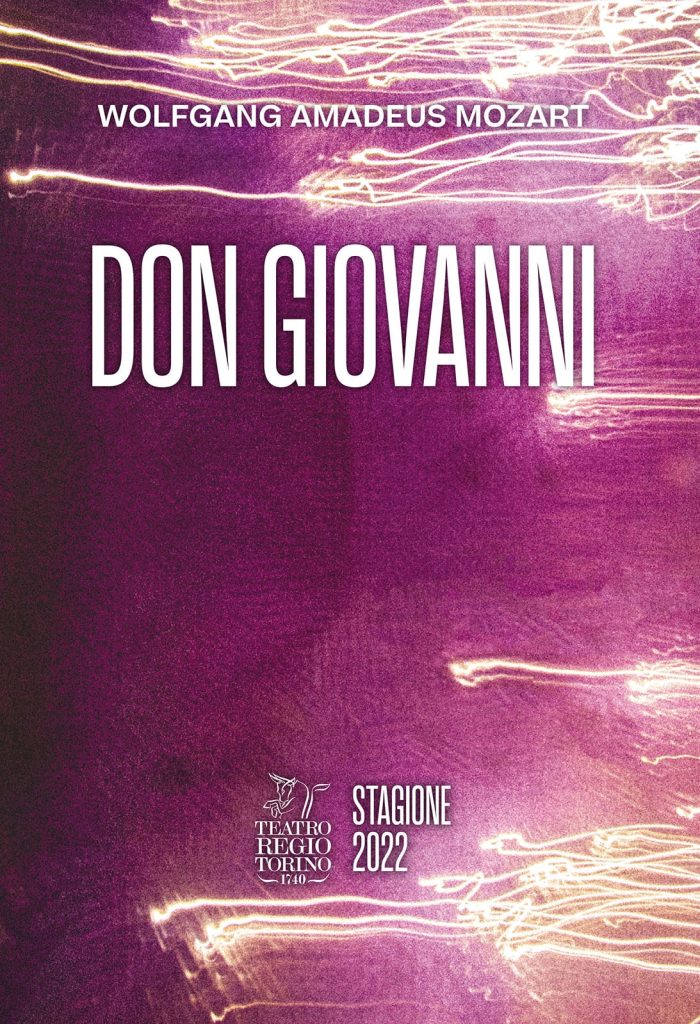
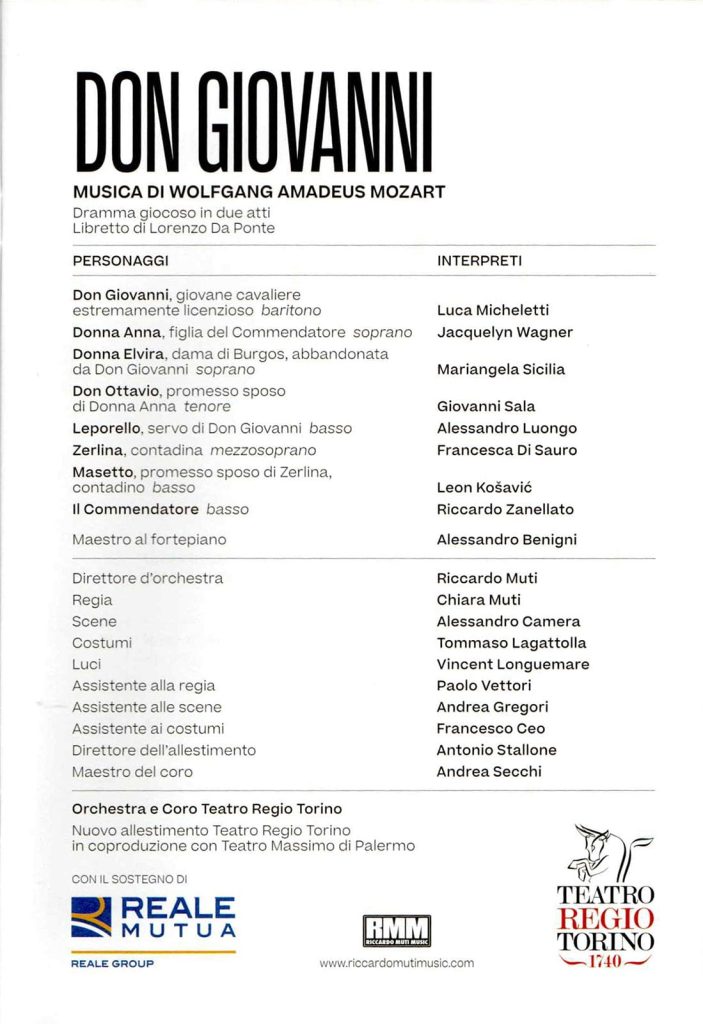
Stage notes
Edmond Rostand
Stage Notes
Edmond Rostand
THE DEVIL
to the Poor.
Drag me here this beautiful empty costume
Where everyone will slip in their dream…
DON JUAN
Huh?
THE DEVIL
You’ll see
What a funny little hell you’re going to have!
DON JUAN
The hell of monsters… of Nero… of Heliogabalus?
THE DEVIL
No! A little hell of fabric to be dragged around.
DON JUAN
The puppet?… I want to be damned!
THE DEVIL
You will be
A puppet, and you will endlessly repeat
The eternal adultery in a bluish square.
DON JUAN
Grace! The eternal fire!
THE DEVIL
No! The eternal theater!
The facade of a ruined noble palace, collapsed to the ground, still smoking from the last scene just completed and already ready to be recounted. Rags of a theater decoration worn out by time… From the overturned doors on the floor, more like tombs than magnificent places of meetings, puppet bodies rise from the ashes of a time long past, worn out, dusty…
They drag themselves in search of a stereotype to cling to in order to return to existence.
From above, hanging from the threads of an imaginary puppeteer, God for some, chance for others, the costumes descend that will dress them with a new beginning.
Like newborns to life, here they are, the six characters, one by one discovering the role they are destined for, to again shipwreck upon the boards of that stage that is the world.
The first to escape the void is a grumbling and resentful servant, Leporello, who grabs the clothes protesting injustice with the cry “I want to be a gentleman, and I don’t want to serve anymore…!”, his protests are cut short by the arrival of a dishonored noblewoman, who at the mere sight of the dress that will transform her into Donna Anna, like a fury, will throw herself into the crack in the ground still smoking to catch the author of her woes. Following her will be Ottavio, the noble and insulted lover, Elvira, the betrayed and abandoned wife, Zerlina, the naïve and flirtatious peasant, and Masetto, the jealous and foolhardy groom. These six characters are nothing but satellites in search of a planet to orbit around, and that planet is Don Giovanni.
Rainer Maria Rilke
And the angel came to him and said: Dedicate all of yourself to me. This is my command.
I need a man who more than others knows how to make the sweetest women at his side make life bitter. Not that you love better (don’t interrupt me: you are wrong); still, you burn, and it is written that you will lead many women to that loneliness which opens the way through this deep door.
Don Giovanni would not exist without women!
He owes his name to his prey, they are the true protagonists of his story, the women evoked by rank, form, and age in the catalog by the servant Leporello. They are the blonde, the brunette, the white, the fat, the thin, the big majestic one, the tiny coquettish one, the old one, the young beginner, the rich, the ugly, and the beautiful…
The twelve entities that wander on stage are the shadows of Don Giovanni’s remorse, or rather what they are seeking in vain, torturing themselves without peace, and what they would like to see flashing in the depths of his elusive eyes, in order to free themselves from the humiliation of having, one day, been his victims. Women who belong to all eras, testifying to the demonic longevity of their executioner, whose cloak changes color with the desire of each beautiful woman. Anna is a lady at the court of King Louis, virtuous and sinful, half Madame de Maintenon, half Madame de Montespan, Elvira wears the clothes of a countess of the Belle Époque, cerebral, hysterical, and eternally dissatisfied, Zerlina is the sensual and welcoming doll of the 1950s, made by man for man. All the others are nameless… Echoes of history… immortal because possessed, used, humiliated, seduced, mistreated, and condemned to the dull sound of oblivion.
Alfred de Musset
They loved you though, those foolish girls
Whom on your iron heart you pressed one by one;
The wind that carried them had passed through them;
They loved you, Don Juan, those poor abandoned ones
Who covered with kisses the shadow of your love,
Who gave you their lives, and who had only one
[day!
Don Giovanni is free will! A worthy son of that angel of Paradise who defied God, he holds firmly the reins of his destiny, and can well invite death to dinner!
The myth he embodies has made him immune, the archetype he represents has freed him from the strings to which all others are tied, and no fear of God will ever tame him!
A positive hero for the commedia dell’arte actors, with his jests and curses he would send the crowds into rapture! The scorn he had for death exalted the masses oppressed by the precepts of the clergy, gratifying them with a sense of revenge. And thus, through the centuries, we find a beloved and popular Don Giovanni, never hateful or repugnant, but brave and fascinating!
A symbol of the seducer male who pursues his primal and animal instinct as an insatiable predator, whose pollinated flowers ensure the brilliance of nature, in the 18th century he is a libertine son of the Enlightenment, noble, cultured, refined poet and father of a legion of countless disciples, among whom Giacomo Casanova, who legend says was present at the first performance of the opera in Prague in 1787. I imagine them, Mozart and Da Ponte, by candlelight with a good glass of “excellent Marzemino,” distilling vices and virtues of Don Giovanni-ism guided by the wit of one of his most faithful followers.
“Who is faithful to one and cruel to the others; I, who in me feel such a widespread sentiment, love them all: the women who do not know how to calculate, call my good nature deceit”.
Certainly, Leopold Mozart would not have approved of the Don Giovanni libretto, but Leopold was no longer there, he had passed away a few months earlier, and in this sense, the relationship between Don Giovanni and the Commendatore takes on a new light. The Commendatore is Don Giovanni’s clean conscience, the judging shadow of
that light that the Dissolute Man is renouncing, in the duel between them, Don Giovanni fights against himself.
“Fight with me,” the Commendatore commands.
“No, I refuse to fight with you”.
“Thus you demand that I flee from you” – it’s as though Don Giovanni is speaking to himself and whispering, “You cannot flee from yourself… One day, you will have to face your conscience.” Perhaps that’s why, after that sublime metaphysical page of the trio at the death of the Commendatore, Leporello’s question to his master seems no longer funny, but of a disturbing psychoanalytic depth: “Who’s dead? You or the old man?” As if to say, “Which part of you has been saved… the light or the darkness?”
The servant himself understands that the living, by killing the good part of themselves, has already plunged into the abyss of no return.
The boundary between the world of the dead and the world of the living is fragile. In this story, everyone would like to be like Don Giovanni… Ottavio would like his virility and courage, Leporello his money and privileges, and Masetto his culture and nobility.
The women, on the other hand, would secretly all like to be possessed, it is clear how, in the end, we end up liking the one whom we should morally condemn! And Mozart left him without a real aria because Don Giovanni lives in others… He has no time to waste and runs straight into his destiny. The others, on the other hand, are inconclusive supporting actors, aspiring protagonists! Anna, for example, who despairs over her father’s death, does so in a forced manner, lacking all spontaneity, and reminds me of the agonizing and self-satisfied Desdemona of Laura Betti in “What Are the Clouds” by Pasolini; a brilliant fresco on the human condition. Anna performs suffering badly and with such emphasis that one wonders if Mozart lacked the inspiration to mourn a father, or if he didn’t do it on purpose! After all, it’s a dramma giocoso! The party at Don Giovanni’s house is a gloomy gathering of masks, whose judgment bursts in impersonated by three statues from a procession, with wax tears affixed to their faces to atone for the world’s sins. Anna, Elvira, and Ottavio, who remind us so much of the devout, are forced to hypocritically sing “Long live freedom” at the feet of a tyrant who celebrates his creed by crowning himself! The aristocratic Don Giovanni can act with impunity, Molière knew this, and Mozart and Da Ponte knew it too, “Nobility has honesty painted in its eyes”. But death is a leveler…
In the cemetery, Don Giovanni finds himself before a heap of discarded puppets, abandoned crates full of rags, memories of stories now doomed to oblivion.
Haphazardly hanging like everyone else, the puppet of the Commendatore is silent, helpless. Death humiliates the flesh and destroys all kinds of privilege.
Don Giovanni scorns it and challenges it by inviting it to dinner.
Alfred de Musset
And the day the stone guest appeared,
You came to meet him and extended your hand;
You fell struck down upon your last feast:
A marvelous symbol of man on earth,
Trying with your left hand to raise your glass,
Abandoning your right to that of Fate!
In a desolate scene, our hero, alone, like a condemned man, waits, seated in that chair that accompanied Molière in his final moments of theater. A tribute to his genius that sublimated Don Giovanni, making him immortal. An immense shadow bursts onto the stage, the stone conscience demands to be heard! It demands repentance. Don Giovanni renounce himself? As vile Faust did in front of the gates of hell? Never! Salvation would be a defeat for him. In those angry no’s, repeated endlessly, the myth of Don Giovanni lives on. The shadow seems to give up its redemption mission! It will be the women who will condemn him… Forced to look inside himself… and see his reflection as they see it, and bear its gaze… Their eyes, burned by tears, pierced like arrows into his. The mystery of what one truly is is unbearable… The spell of invulnerability to remorse breaks… Don Giovanni plunges into hell. But only for a short time, and he knows it… Evil recognizes evil and elects it as its ambassador on earth.
The others come running, searching for him… they find themselves before the scene from the beginning… the crack in the ground that swallowed him, still smoking. “No longer hope to find him, he has gone far away,” Leporello warns them, in that precipice where he has been made to fall, they can never arrive, anchored to the strings of their decent and boring survival. Thus, Mozart leaves them orphans of the sin to which secretly each one longs. They wander, lost, fantasizing about a future they cannot have, anchored to those costumes that, rising to the sky, leave them naked, without judgment, stuttering a morality now emptied of meaning. While the music fades… oblivion grips them, and they fall to the ground, awaiting to again become intoxicated by that thrill that only a moment of perdition can arouse… that eternity to which the Dissolute Man, by virtue of himself, has already ascended. Eternally free…
Eternally Don Giovanni.



